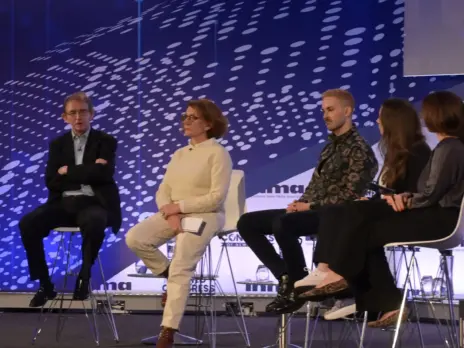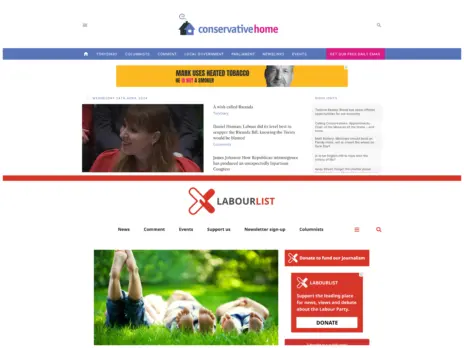"Nib," says Independent editor Amol Rajan as the news that the Duchess of Cambridge is expecting her second child filters through on to the television screen in the corner of his office. True to his word, the next day (last Tuesday), the news features as 15 words on page 16 of the paper.
“I’d never want to do it in a facetious way, but the story is: Young couple has second baby. Which is absolutely wonderful, but we have this rule – and it was one that our great founder, Andreas [Whittam Smith], decided upon at quite an early stage: if you do a royal story, it’s got to have two conditions.
“One, it’s got to be of constitutional importance… and the second thing is it’s got to be done in a proportionate way – so when George was christened we did it as a nib and I was incredibly glad to have done that, because it sort of marks us out.”
But different rules apply for The Independent's cut-price sister title, the i – with the story promoted on its front page the next day – and the paper's website, where it is the third top story as we sit in Rajan's office (he expresses surprise that it's not top).
Rajan emphasises that The Independent maintains independence from the Independent on Sunday, i and the website – and even more so from the Evening Standard and London Live – with the titles managed in a "collegiate way", although they all share the same floor at Northcliffe House, below the Mail titles,
The Independent may have a fraction of the circulation of the i (its ABC for July was just under 63,000) but Rajan still describes his newspaper as "the mothership".
But with its circulation down to a third of what it was at the beginning of 2011, how long can the "mothership" stay afloat? "A long time yet," predicts Rajan, who believes the paper's circulation is stabilising.
Over the last six months, The Independent’s circulation has fallen by 2 per cent, according to ABC, from 63,907 to 62,568. Year on year, the decline is 9 per cent, down from 68,696.
“The Independent’s circulation is low,” Rajan says. “I wish it was higher. But… it’s stable. And our model is, we wanted to reduce our losses very substantially, and stabilise the company so it was losing less money, but grow in the areas that we’re going to grow.”
He highlights the website and newly launched apps, as well as the i, as the growing areas of the business.
The Independent's website recorded an average 2,054,827 daily unique users in July, up 68 per cent year on year. Rajan says: “One of the deepest and most absurd myths – and most ubiquitous myths – about newspapers is the idea that the future of newspapers is unclear. There’s nothing unclear about it: the future’s digital."
The Independent website is currently free to access, but Rajan makes clear that a paywall or metered paywall might be the future. Speaking at the Frontline Club a couple of days after we meet he describes paying for online content as "possibly the most viable future for lots of newspapers".
“Where we’re at commercially, the free model really works for us," he says in his office. "What we’re trying to do is build a huge audience. We’ve done that, [we have] 2m daily uniques… so we’re doing incredibly well at growing our audience and making as many people as possible see Independent journalism.
“I think for the time being we’ll stick at that, but it’s under constant review and it might be that in a year, or a couple of years, we decide to move to a different model…
“I think if we do move to another model it’s much more likely it will be the mixed metered model with some articles free and then a paywall, rather than the full paywall.”
Pointing to the success of cut-price sister title, the i, which was founded in October 2010 and had a circulation of 285,902 in July, Rajan says: “We’re being read by more people in print that at any time since I think about 1995."
But could there be a day soon when the i is the only Independent print edition? “Without The Independent, there is no i,” says Rajan. “It is absurd to pretend the i can flourish without The Independent powering it – at least according to the current model [in which the i generally takes its copy from The Independent].
“So The Independent has got a low circulation, but it’s got a stable circulation. And if you’re the Lebedevs, you’ve owned newspapers for the best part of five years – a bit more – you’ve put in nearly £100m into newspapers. The Independent’s losses have come very, very dramatically down, we’re going into an election, and The Independent [titles] offer… a huge number of things that the Evening Standard doesn’t. The Independent offers a huge, huge international brand.”
Rajan’s belief in the confidence of The Independent’s owners is based not just on regular meetings with Evgeny Lebedev (above, Reuters) – who has an office in Northcliffe House – but also on a one-and-a-half stretch when he was his media adviser.
Rajan joined The Independent from Channel 5’s The Wright Stuff (he describes Matthew Wright as “the best journalist I’ve ever worked with”) in 2007. He worked on the newdesk, comment desk, as a sports news correspondent (Rajan is a sports enthusiast who spends the majority of this interview playing with a cricket ball) and deputy comment editor before going to work for the Lebedevs in March 2011, “which was a wonderful thing”.
What did he do in the role? “What did I not do?” he says, describing it as an “extraordinary and thrilling adventure”. Rajan calls it an “advisory role” in which he handled Lebedev’s PR, wrote speeches, helped raise his profile and promoted him as a press freedom campaigner.
He describes himself as “very close” to the proprietor now, adding: “The Lebedevs are not publishers or proprietors in the conventional sense. They are a long way from Beaverbrook and Northcliffe. But they’ve been completely brilliant. And I feel very, very loyal to them.”
And how hands-on are they as owners? “Evgeny… does a lot of his own journalism – they have quite a principled attachment to journalism and I think Alexander has a very romantic and admirable view of journalism, which is that journalists are the pillars of democracy.
“Evgeny’s got the same thing. I think he genuinely thinks that journalists should be allowed to be journalists. He is also extremely busy with other things and therefore wouldn’t have time to interfere with editorial matters.
“So it’s true that they’re hands-on in the sense that I speak to them all the time, and I spend a lot of time with Evgeny – but they’re not hands-on in the sense of being editorially interfering. We have complete editorial free reign and that’s an incredibly precious thing.”
Rajan returned to journalism in September 2012, launching Independent Voices, before being made editor in June last year. He describes the role of an editor as having three aspects: commercial (how to make and save money), management (leading and motivating a team), and editing itself (“an exercise in selection”).
“Compared with 15 or 20 years ago when newspapers had more money, I think the portion of your job that is editing has probably come down a bit,” he says. “I think you have to spend a huge amount of time thinking about the commercial, when actually it’s the editing that’s the most fun.”
Rajan adds: “Andy Marr (below, Reuters), who’s a hero of mine, said this wonderful, wonderful thing the other day to me when I met him. He said he used to think of an editor as kind of you get to spend all day thinking about great headlines and great stories.
"He said actually as an editor what you spend most of your time doing is making sure that the ship stays afloat, speaking to the proprietor and keeping the whole thing going. It’s not how you imagine it would be. But it is ludicrously fun.”
At 31, Rajan is not the UK's youngest national newspaper editor – owing to the fact Oliver Duff, six days his junior, took charge of the i on the same day.
The pair's similarities stretch beyond their age, jobs and wearing of beards: Rajan describes Duff as an "old friend" who he knew when they were at Cambridge University together (they both edited student newspaper, Varsity).
Along with Archie Bland, The Independent's chief writer who is moving to The Guardian ("the rascal"), and three other former and current Independent staffers, they used to call themselves "the Cambridge Mafia", Rajan says, adding: “None of us hired the others. It wasn’t nepotistic in the sense of there’s an opening, let’s hire our mate from university.”
Last month, The Independent – as well as Press Gazette and a number of other news organisations – reported on a Government study which found that journalism and other professions are disproportionately dominated by public school and Oxbridge-educated people.
As someone who went to a state school (Graveney in Tooting became grant-maintained after Rajan joined, and he describes it as a very good school) and then Cambridge, does Rajan think it's a problem?
"There is a kind of sense in which I guess Oxbridge dominates journalism, as it does many, many other industries," he says. "But I don't think it's an especial problem in journalism. And I don't think that private schools are an especial problem in journalism, worse than say in the City or in law.
"And actually I think that the mad, amazing, wonderful flourishing of websites, which is tomorrow's journalism – the HuffPos and Buzzfeeds and so on – will favour people who are really, really good… So I don't think it's this terrible problem."
He concedes that there probably is an Oxbridge and private school dominance among editors in the UK, but feels sure "that'll change".
"The other thing I get, people say there's a big problem with ethnic minorities – and it's true that there's probably some under-representation," he says. "But actually things are changing and I don't want to be seen as 'the Indian editor'.
"I'm incredibly lucky to be someone who was allegedly – although not quite – the first non-white person to have a job like this, but what anything I or my generation will achieve will pale in comparison to what my parents, who actually came from India, achieved.
"I find the idea that I'm some kind of ethnic minority ambassador… or some sort of state school ambassador a bit weird. I just don't really think about that stuff.
"I suppose I don't think about it because I don't think it's a huge, huge entrenched problem. There aren't a huge amount of brown or black-skinned columnists, and I hope that changes, but actually that is changing slowly, so I feel pretty chilled out about it, really.
"That's not what you're meant to say," he adds. "You're meant to say: 'It's a fucking disaster – awful!'"
Rajan, in this interview, comes across as an optimist and he clearly feels that too much is made of the Independent titles' troubles – particularly by rivals.
He says. "The propaganda that is churned out about The Independent and the ignorance that accompanies it is absolutely mind-blowing. And it's very, very difficult for me because… there's a lot of commercially confidential stuff that goes on which you can't talk about [to staff].
"Some of the stuff that is written about us is literally industrialised bullshit masquerading as journalism. It's awful."
Rajan says that The Independent has gone from losing £12.6m in the year he arrived, to now aiming to lose £5m in the 2013/14 fiscal year. He is confident of the Lebedevs’ long-term commitment to the title, but knows the “need to keep attacking those losses”.
Through more job losses? “None that I know about,” he says. “On current plans I hope that there isn’t need for a run of redundancies like there were last year. [In April, two months before Rajan had taken charge, 15 journalists took voluntary redundancy, and the paper announced in July that there would be 27 further compulsory job losses.]”
Rajan says: “When I announced all of these horrendously painful and regrettable redundancies, I said to the staff a couple of weeks after I started: 'There is a future for these papers provided we get the losses down.'
"We’ve done that. And we’re going into an election with our losses massively, massively down, growing very, very fast digitally and, as I say, we’re growing in print.”
Email pged@pressgazette.co.uk to point out mistakes, provide story tips or send in a letter for publication on our "Letters Page" blog






